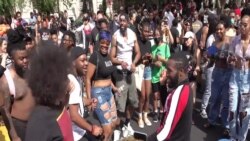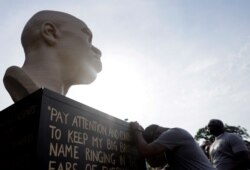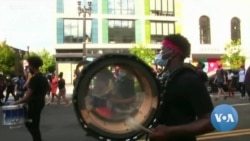Juneteenth is America’s newest federal holiday after President Joe Biden signed it into law Thursday. But African Americans have celebrated every June 19 since 1865, when the last enslaved Blacks learned of their freedom on that date, two-and-a- half years after President Abraham Lincoln signed the Emancipation Proclamation. It also has been a day to reflect on their struggle for freedom and justice, and to teach vital history to younger generations.
Kelly Elaine Navies, a museum specialist and oral historian at the National Museum of African American History and Culture in Washington, explains that General Gordon Granger arrived in the city of Galveston, Texas, on June 19, 1865. He was accompanied by 1,800 Union troops, many of whom were United States Colored Troops, and he announced General Order No. 3, which notified Texans that all enslaved people were no longer in bondage.
“That's stating that the slavery was legally ended and that the enslaved were now free. This was important because although the Emancipation Proclamation had been signed on January 1, 1863, that really only impacted states in the Confederacy, and then only states where there was a union presence,” Navies said.
Navies recalled when she was a child, her father, who was an educator, made it a tradition to celebrate Juneteenth, also known as Freedom Day.
“He would invite not just his students at Berkeley High School, but he would also invite his friends and family and members of the community. Barbecuing all hours of the night, from a young age, my job was to chop onions and potatoes,” Navies said. “And we would have a program that was intergenerational. Children would perform and read poetry, create dances and open mic. Elders will speak and share stories of their experiences with being Black in America.”
Juneteenth has been a state holiday in nearly all 50 U.S. states and the District of Columbia. Last year, in the wake of millions demonstrating against racial injustice after the killings of George Floyd, Breonna Taylor and others, a bipartisan group tried to get Congress to recognize Juneteenth as a federal holiday.
On Thursday, after more than 150 years, Juneteenth was established as the newest federal holiday at a White House ceremony after a bill was passed days earlier by Congress.
Howard University School of Law Professor Justin Hansford said Juneteenth is not just a celebration of the emancipation of enslaved African Americans, but also a day of remembrance.
“I am eager to see not only the Juneteenth holiday be recognized by the federal government, but I am eager to see how it is recognized, how it is celebrated, how it is used as a tool of education for people and how it can ultimately bring us more in line with what the hope of the emancipation was, which is freedom for everybody. I think it can be a positive development for good for all of us,” Hansford said.
But the Howard University law professor also noted the dichotomy between what happened in Washington and current events in the state of Texas.
“On the same day that Juneteenth [bill] passed in the Senate, the state of Texas, where Juneteenth originates from, passed the law banning the teaching of the 1619 Project, banning critical race theory, banning the opportunity to teach about Black history,” Hansford said. “So, it’s almost like a joke where you pass a proclamation recognizing an important moment in Black history and at the same time on the same day, the state where that particular incident took place is passing a law banning the teaching of Black history.”
HB 3979, legislation to abolish critical race theory in Texas, was signed into law on June 16 by Texas Governor Greg Abbott.
The bill, which takes effect on September 1, was sponsored by state Representative Steve Toth. Despite the fact the measure banned critical race theory, he said in an interview with the National Review that “The facts are very clear, very explicit, we don’t ban, we don’t discourage the discussion of anything.”
But Hansford said it’s important to understand there is a connection between Juneteenth and the banning of certain teachings.
“Don’t forget that the Juneteenth story is a story about Black people who were free, but the knowledge of their freedom, the awareness of their freedom was denied to them,” Hansford said. “And here at the same time, we see that same denial of access to information, and the denial of access to knowledge being written into law in the state of Texas, the state of Florida and other states that are passing these anti-critical-race-theory laws.”
Critical race theory, according to Hansford, is “a field of study that seeks to uncover the way that race played a central role in how American society is structured.” While debated by academics since the 1970s, it has only recently become a political issue.
Last week, Florida’s Board of Education banned the teaching of the theory from its public schools. Florida Governor Ron DeSantis explained why he supports the ban in a recent interview with WPLG, an ABC-affiliated television station in Miami.
“I think it'll cause people to think of themselves more as a member of a particular race based on skin color rather than based on the content of their character,” DeSantis said.
In Leesburg, Virginia, near Washington, last weekend, a rally was held against critical race theory teaching. Activist Patti Menders explained she opposes anti-racism teaching because she believes it trains white children to see themselves as "oppressors."
But while school curriculum is a lightning rod for controversy, a Juneteenth federal holiday has become law.









